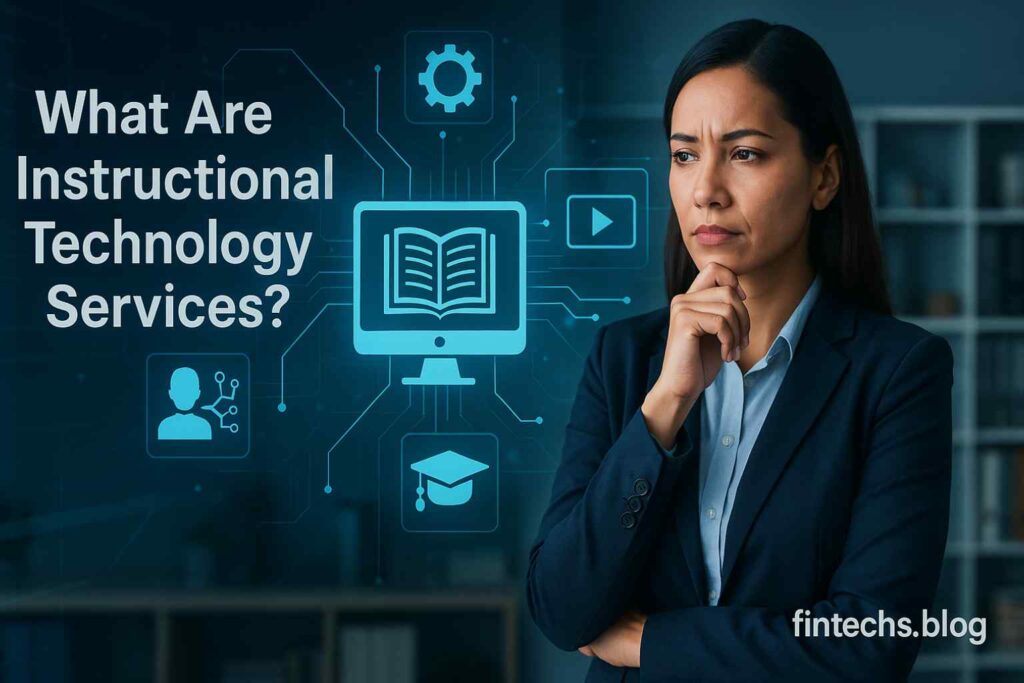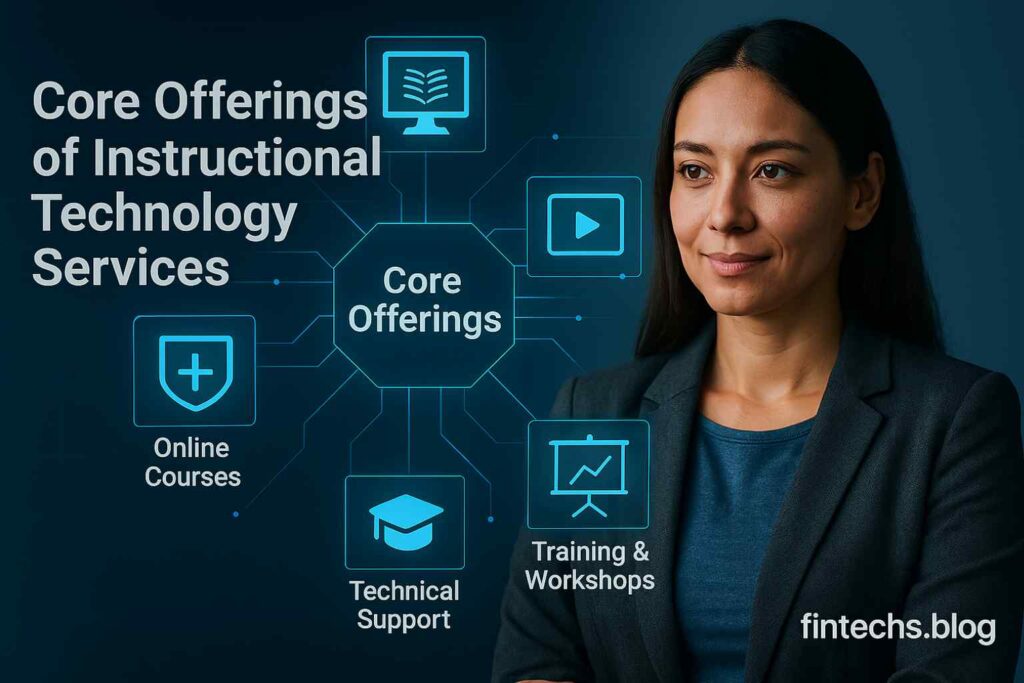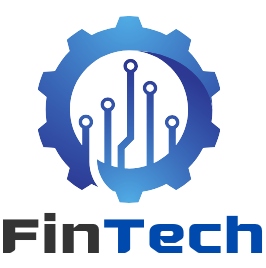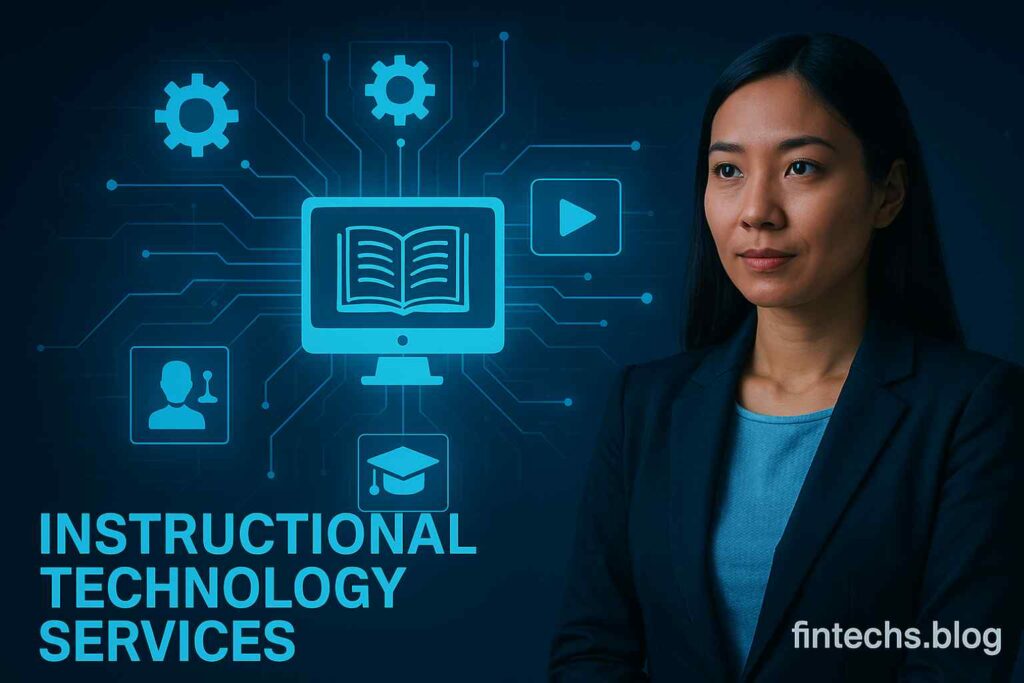Introduction
Technology has become an essential tool in modern education, transforming the way instructors teach and students learn. Instructional technology services play a pivotal role in integrating digital tools, platforms, and methodologies into the classroom experience. These services are designed not only to enhance teaching effectiveness but also to empower learners through accessible, interactive, and engaging content.
With the rapid growth of e-learning, hybrid classrooms, and digital curriculum, the demand for reliable and innovative instructional technology support has surged. Educational institutions now rely heavily on dedicated services that provide training, tools, and ongoing assistance to keep educators and students at the forefront of digital learning.

What Are Instructional Technology Services?
Instructional technology services refer to the specialized support systems that help educators integrate technology into their teaching practices. This includes everything from software installation and platform training to classroom equipment setup and digital content creation.
These services are often provided by in-house teams within schools, colleges, and universities or through external vendors. Their main goal is to make the learning process smoother, more efficient, and tailored to 21st-century education standards.
Why Instructional Technology Services Are Crucial in Education
The integration of technology into the classroom brings countless benefits, but only when it is implemented correctly. Instructional technology services ensure that teachers have the tools and support they need to effectively use technology to meet their learning objectives.
Additionally, these services bridge the gap between traditional teaching methods and modern digital approaches. They help create inclusive learning environments where students of different learning styles and abilities can thrive.
Training and Development for Educators
To fully leverage technology in the classroom, teachers must be comfortable and confident using it. Instructional technology services often include professional development workshops, one-on-one coaching, and certification programs tailored to different skill levels.
By participating in these programs, faculty members not only improve their technical skills but also gain strategies for creating more engaging and impactful lessons. This leads to better student outcomes and a more dynamic learning environment overall.

Core Offerings of Instructional Technology Services
Instructional technology services encompass a wide range of support functions tailored to the needs of educators and institutions. Here’s a quick overview of the most common offerings:
| Service Type | Description |
|---|---|
| LMS Support | Technical help and training for platforms like Canvas, Moodle, or Blackboard |
| Hardware & AV Assistance | Classroom technology setup including projectors, smart boards, and microphones |
| Faculty Training | Workshops and tutorials on using digital tools effectively in teaching |
| E-learning Development | Designing and supporting online or blended learning programs |
| Digital Content Integration | Help with embedding videos, simulations, and interactive tools in courses |
Support for Remote and Hybrid Learning Models
Instructional technology services have become even more vital with the rise of remote and hybrid learning. From setting up virtual classrooms to ensuring reliable video conferencing tools, these services keep everything running smoothly.
They also assist with troubleshooting connectivity issues, integrating cloud-based storage, and maintaining secure access to educational materials. As a result, both students and teachers can focus on learning instead of tech problems.
Enhancing Student Engagement Through Technology
Effective use of technology can greatly improve student engagement. Tools like interactive quizzes, gamification platforms, and real-time feedback apps help maintain student interest and participation.
Instructional technology teams work with educators to identify the right tools and integrate them into course plans in a meaningful way. This collaborative approach leads to more personalized and effective learning experiences.
Ensuring Accessibility and Inclusive Education
Technology should serve all learners, including those with disabilities or special needs. Instructional technology services often focus on accessibility features such as screen readers, captioning tools, and adaptive learning systems.
By ensuring that digital content meets accessibility standards, institutions can offer inclusive education that reaches every student regardless of their physical or cognitive limitations.

Monitoring and Evaluation of Tech Usage in Education
Just implementing technology isn’t enough — it’s essential to measure its impact. Instructional technology services often include data tracking and analytics to evaluate how effectively technology is being used in classrooms.
These insights help in making informed decisions about future tech investments and in identifying areas where additional training or resources may be required.
Customization for Different Academic Departments
Different academic disciplines have different technological needs. Instructional technology services offer customized solutions that cater to the specific requirements of each department, whether it’s science labs, art studios, or language centers.
This personalized approach ensures that every educator has access to tools that align with their subject matter and teaching methods.
The Role of Instructional Technology Teams
Instructional technology teams often consist of specialists in software, hardware, pedagogy, and user experience. Their combined expertise ensures that educational institutions can adopt and maintain advanced technology systems with confidence.
They work closely with faculty and administrators to provide timely support, introduce new tools, and continuously improve the digital learning environment.
Also Read: How SEO Content Writing Services Help Brands 2025
Conclusion
Empowering education through technology is no longer optional — it’s a necessity. Instructional technology services play a foundational role in supporting educators, enhancing student engagement, and ensuring institutions stay competitive in a digital world. By offering customized training, reliable tech support, and a commitment to inclusive learning, these services transform classrooms into dynamic, future-ready spaces where innovation and education go hand in hand.
FAQ About Instructional Technology Services
Q1: What is instructional technology and examples?
Ans: Instructional technology refers to tools and strategies used to enhance learning. Examples include learning management systems, interactive whiteboards, and educational software.
Q2: What does an instructional technology specialist do?
They help educators integrate technology into teaching by training staff, selecting tools, and improving digital learning experiences.
Q3: What are the 5 basic concepts of instructional technology?
Ans: The core concepts are analysis, design, development, implementation, and evaluation (ADDIE model).
Q4: What does an instructional technology coach do?
Ans: They support teachers in using tech tools effectively, offer one-on-one guidance, and develop digital learning strategies.
Q5: What is the difference between assistive technology and instructional technology?
Ans: Assistive tech helps students with disabilities access learning, while instructional tech improves teaching for all learners.
Q6: What does instructional technology involve?
Ans: It involves designing, implementing, and managing tech-based educational tools to improve teaching and learning outcomes.
Q7: What is the difference between educational technology and instructional technology?
Ans: Educational tech is a broad term including all learning tech, while instructional tech focuses specifically on improving teaching methods.







